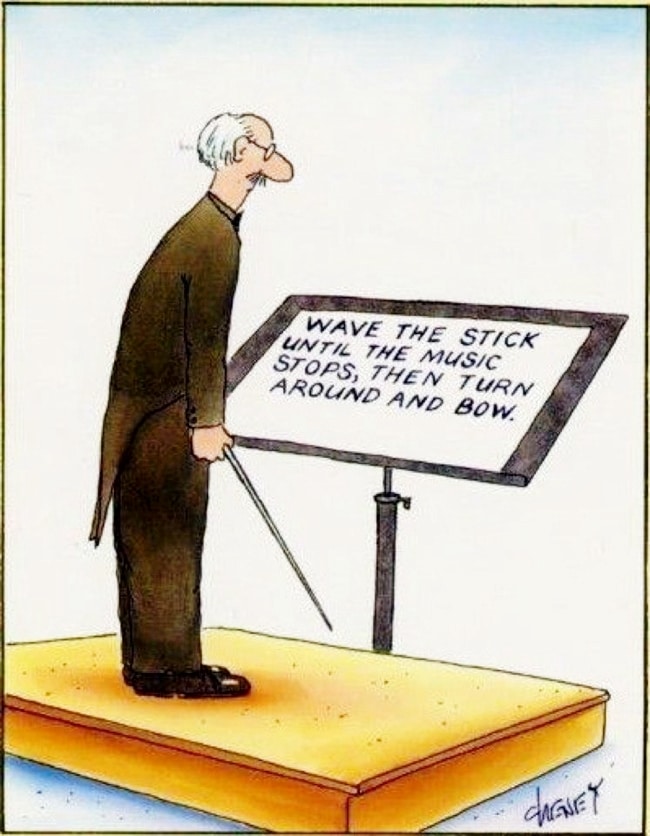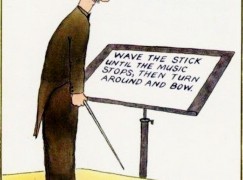The next music director must be male
mainFrom a recruitment ad by the Symphony of the Americas on long-behind-the-times MusicalAmerica:
The Music Director position reports directly to the Board of Directors and is responsible for the furthering of the orchestra’s artistic potential and mission of supporting and developing community relationships as well as its international guest artist series, its summer music festival, its Serenades@Sunset series, and its varied educational programs. In furthering these goals, he is responsible for the musical programming, repertoire, and artistic production. He has the authority for the selection of musicians. The music director is expected to work directly with the Executive Director, the Board of Directors and staff in carrying out these responsibilities. He is also expected to be active in and attend all of the orchestra’s fundraising activities, as well as meet one-on-one with potential funders when appropriate.







Wow. In this day and age, really? Surely they will amend it. They have to. Whoever redacted the ad is obviously an analphabet in more ways than one.
One can change the ‘he’ into ‘it’, to avoid the irritating repetetive he/she, or she/he (to accomodate the feminists), and turn the conducting person into a neutral entity, like ‘chairperson’. Then all variations of gender are covered.
In English, there is a long-standing usage of the third person plural “they” to refer to a person in the singular where the gender is unspecified. This goes back to Anglo-Saxon times. E.g. “Which of you has forgotten to tune their violin?” “Could the person singing a page behind everybody else please turn over their music?”
Brava
They had violins in Anglo-Saxon England?
“Their” has for years been considered ungrammatical in the sense you no doubt correctly identify. I do not remember enough of the A-S I was force-fed at university to confirm or argue.
Nowadays, some of the gender-fluidity arguments are proponents of the same thing. It annoys me as it is a kind of linguistic political correctness that would not be necessary if people were not so busy being “sensitive” and finding a victimhood in longstanding and useful rules of grammar that were not designed to “oppress.” Yes, the inclusive “he” or “man” is reflective of a probably almost unthinking male dominance in society, but we got on with it and understood it and it worked.
This ad does not, to my eyes, exclude women, It suggests to me that someone writing it is a balanced individual.
It must be quite advantageous these days to be gender-fluid. One can switch any gender role to either be linguistically oppressive or victimized.
Situations of gender-politeness which were, in former days, pleasurable for both genders (i.e. female and male), have become complicated and politically-suspicious. Where a polite, well-mannered gentleman opens the door of his Rolls for his female companion, is he being culturally-suppressive? Is the woman, in accepting her receiving role, merely confirming reactionary, male-dominating gender roles which bereave her of meaningful influence in society, so: as a victim, or is she manipulating male domination to get what she wants in a backhand way? How do we know? And how does SHE know, or HE? Such simple occasions have now become the subject of such hard thinking that, most of the time, women open the door themsevles, to save them the trouble to find-out.
Once when I opened the door for a lady at Maxim’s, she said in a disapproving tone: ‘How DARE you!’ but took the advantage anyway. That always seemed to me the best way for females today to defend themselves against politically-incorrect cultural and social suppression.
Norman, dear. Musical America does not write the ads that appear on its award-winning website. The client pays HIS money and MA is entitled to touch it. So do explain why you call us “behind the times.” Ageism? Sexism? The editor is a woman and not very old.
Nicholas is wrong. Musical America is NOT entitled to touch the ad, which is the whole point.
I confess I was shocked for some seconds.
I was going to ask the same question. Why blame the publication for the wording of the job advertisement? Do they actually write the ads? Do magazines usually assume editorial responsibility for how ads are written, or do they normally advise advertisers on proper wording/ spelling/ grammar/ punctuation? Did Musical America somehow fail to do something they should have done? (The answer might be yes, for all I know; I’m not familiar with the magazine publishing business.)
Behind Slipped Disc on news. Light years behind in readership.
Ah. So it’s a competitive response, not an actual critique.
From the EEOC, under “Prohibited practices”:
“It is illegal for an employer to publish a job advertisement that shows a preference for or discourages someone from applying for a job because of his or her race, color, religion, sex…”
The magazine could have flagged the problem. It would have been easy to substitute “the music director” for “he.”
I don’t think the feds will be knocking on anyone’s door for this slip up, however.
I recall in junior high trying to use the newly proposed, gender-neutral “zhe” in an English assignment.
Nope. Teacher (male) wouldn’t have it.
There is also a linguistic/philosophical issue here. ‘He’ has two meanings: a) an indication of a male person and b) a general indication of a human being. According to context, b can be used entirely harmless to women, as in ‘mankind’, as the name of God in texts does not specifically mean that ‘he’ is a male. Some modern theologicans wanting to be up-to-date talk about God and ‘her’ message, which is just silly because suddenly the reader is pointed towards God’s gender which is not an issue with ‘his’, also not with female readers (readeresses?). Language is the product of the past, and changing it too much according to new political urges can make existing texts unreadable, blocking them for future understanding.
Reading a book where the eye is stumbling all the time on the he/she indication or she/he, is tiring and distracting. And there is no reason why a chairman cannot be a woman, or a conductor a woman. And if we want to be truly hairsplitting, the second part of the word ‘woman’ is male too. (Would we want it replaced by ‘wothing’ or wobeing’ or woperson’?)
There are so many words including a ‘male’: manufacture, manicure, management, manslaughter, mandate (a nice dinner with a man?), manhunt, manifest, manipulation, mansion, manure, manzanilla.
John, I’m sure that you are only joking, but I feel that I have to point out that manufacture, manicure, management, mandate, manifest, manipulation, and manure all derive not from our Germanic word ‘man’, but from the Latin word ‘manus’, meaning ‘hand’. ‘Mansion’ comes from another Latin word, ‘mansio’, in the sense of being a place where somebody dwells permanently or stays temporarily. ‘Manzanilla’ is the diminutive of the Spanish word for an apple, ‘manzana’.
In general, I was going to make the point myself that ‘he’ at any rate historically was indeed used both to denote masculine gender and as a gender-neutral pronoun. In the Book of Common Prayer, for example, we are familiar with the wording, ‘Therefore if any man can shew any just cause, why they may not lawfully be joined together, let him now speak, or else hereafter for ever hold his peace.’ The meaning of this form of words clearly is, ‘… if any person can shew any just cause, why they may not lawfully be joined together, let him or her now speak, or else hereafter for ever hold his or her peace.’ Language does, however, evolve, and in our own times we perhaps ought to use language which is more clearly gender neutral or, indeed, which does not have the appearance of being gender specific.
When I was a child, for example, the terms ‘coloured’ and ‘half-caste’ were routinely used with no intention whatsoever to cause offence to black or mixed-race people. I also grew up singing what were then called ‘negro spirituals’. I think that today I would be somewhat cautious about using the term ‘negro’, even when using it in its historical and inoffensive context. We all know that there is nothing inherently offensive about the etymology of the word ‘negro’, but we also know that its usage is at best contentious and at worst racist.
I’m tired of this eternal quest for gender neutrality. I am female and was raised with the encompassing meaning if “he” or “man.” I wish people would just grow up and not bristle if they hear some woman referred to as a chairman
I am more open to the seemingly constant evolution of how one may refer to other races — as they choose is my attitude. But I am not hostile to older people who still use the terms from their own youth or most of their lifetimes — they mean no harm. and these things do evolve; they are not announced, so that the older folks can be accused of not keeping up. There are words that were always slurs, none of which has been used in your post. Those words can be condemned in any age-group, as they contain condescension at least and hatred at worst. Anyway, one might recall the words behind one of the major associations for the interests of the African-American: the NAACP.
As for the ad, I am more annoyed that the job of a conductor has so much to do with fundraising. But that’s the way of the world.
I think I first began to be aware of gender-neutral language about 25 years ago when I went to church on a Sunday morning and learned that the wording of the general confession was to be changed from ‘we have sinned against you and against our fellow man’ to ‘…and against our neighbour’. Also, the translation of the Nicene Creed was to be changed from ‘for us men and for our salvation’ to ‘for us and for our salvation’, which of course isn’t a translation at all, as it deliberately misses out a word from the original Greek/Latin. Actually, somewhat earlier than that I remember seeing a library book in which a slip of paper reading ‘humankind’ had been pasted over the word ‘mankind’.
If we take it that gender-neutral language has been with us for around 25-30 years that means that anybody under the age of around 40 will consider it to be completely normal. For people working in fields such as law and education, where these trends are taken up more quickly and more enthusiastically, I imagine that gender-neutral language will come naturally to anyone under the age of around 50. For people in their 40s and 50s and upwards gender-neutral language may be an irritation, but for around half of the population of the anglophone world, *not* using gender-neutral language is clearly an irritation or indeed actually offensive.
The fact is that we all end up being behind the times. Although I was brought up in a time and a place when every politically correct trend imaginable was being actively promoted by government and the education system, I now find myself behind the times with subsequent developments. I find it very difficult, for example, to bring myself to refer to gender non-binary people as they/them/their. This isn’t because I am particularly bigoted towards them, but simply because it doesn’t come naturally to my grasp of my native language to say, ‘I met a delightful person named Jo(e). They are a schoolteacher. I asked them about the state of education in Arkansas. Their specialism is American literature.’ Similarly, I can’t quite bring myself to write ‘Black’ (instead of ‘black’) and ‘Deaf’ (instead of ‘deaf’). To my mind these adjectives are not derived from proper nouns and it is simply inaccurate to write ‘John is Black’/’Mary is Deaf’ as if it were no different to writing ‘Kasia is Polish’/’Pierre is French’.
As for the advert, I don’t think it’s technically wrong, but it is pretty tin-eared in this day and age with current sensitivities about women breaking into the conducting profession in substantial numbers for the first time ever.
I suppose in the future ‘other people’ will be described as ‘it’: ‘Yesterday I met a nice person, it works at the library and it is instructed to select all the books with gender-offensive words in them.’
But, on a serious note, such developments do immense harm to the existing bulk of texts. Think of all the literature, plays, poetry, philosophy, etc. etc. all politically-incorrect without intention. And then: grammar. It is already hard as it is, and will become harder and less comprehensible. And what about, for instance, the French and German languages? They have strong devisions in female and male words, with the connected grammar rules. Unravelling such cultural constructions is merely damaging them, not improving them. It has something of the inquisition about it.
And then, a terrible suspicion: what if in the mentioned ad, they really want ‘a man’ as a conductor? Are they free to have such wishes? Maybe they have some serious reason for this predeliction, like over-sensitivity to female charm, or a majority of players with recent negative experiences in divorce procedures? Is one free to be prejudiced about gender roles? And if not, would a law be needed to ‘correct’ such people? Or would some sort of language concentration camp be needed to set-up?
“Or would some sort of language concentration camp be needed to set-up?”
It must be fun going shopping with you.
“May I interest you in this pair of…” – “Hitler also wore shoes!”
Well, the offenderati is out bright and early today!! And predictable.
Vintage Slipped Disc. A pointless discussion approaching two dozen posts.
How stupid. An Englishman should know the language well enough to know that men have to sacrifice their pronoun to stand for all people, as in Mankind. To play political games over this is juvenile and pathetic. But I hope it will be a man. The way you seem to want the world, only women will be allowed to conduct.